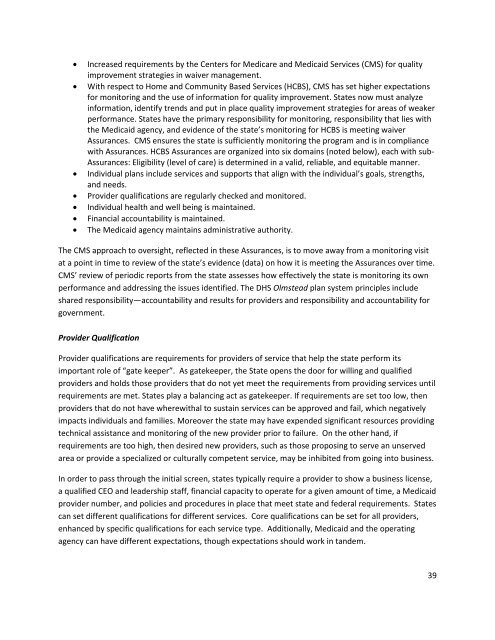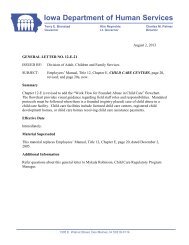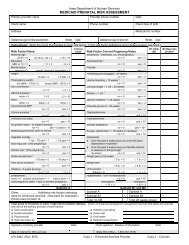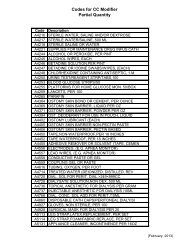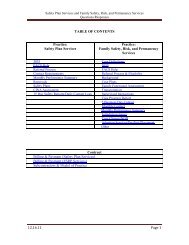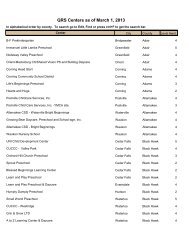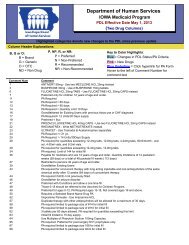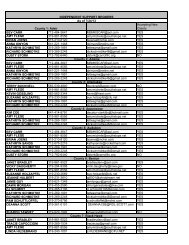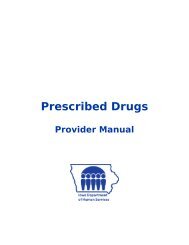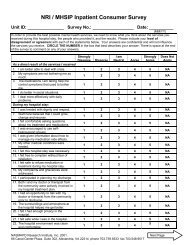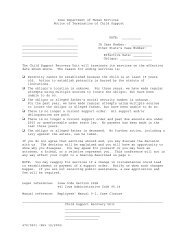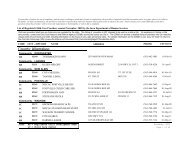Iowa Mental Health and Disability Services System Redesign Interim ...
Iowa Mental Health and Disability Services System Redesign Interim ...
Iowa Mental Health and Disability Services System Redesign Interim ...
- No tags were found...
You also want an ePaper? Increase the reach of your titles
YUMPU automatically turns print PDFs into web optimized ePapers that Google loves.
• Increased requirements by the Centers for Medicare <strong>and</strong> Medicaid <strong>Services</strong> (CMS) for quality<br />
improvement strategies in waiver management.<br />
• With respect to Home <strong>and</strong> Community Based <strong>Services</strong> (HCBS), CMS has set higher expectations<br />
for monitoring <strong>and</strong> the use of information for quality improvement. States now must analyze<br />
information, identify trends <strong>and</strong> put in place quality improvement strategies for areas of weaker<br />
performance. States have the primary responsibility for monitoring, responsibility that lies with<br />
the Medicaid agency, <strong>and</strong> evidence of the state’s monitoring for HCBS is meeting waiver<br />
Assurances. CMS ensures the state is sufficiently monitoring the program <strong>and</strong> is in compliance<br />
with Assurances. HCBS Assurances are organized into six domains (noted below), each with sub-<br />
Assurances: Eligibility (level of care) is determined in a valid, reliable, <strong>and</strong> equitable manner.<br />
• Individual plans include services <strong>and</strong> supports that align with the individual’s goals, strengths,<br />
<strong>and</strong> needs.<br />
• Provider qualifications are regularly checked <strong>and</strong> monitored.<br />
• Individual health <strong>and</strong> well being is maintained.<br />
• Financial accountability is maintained.<br />
• The Medicaid agency maintains administrative authority.<br />
The CMS approach to oversight, reflected in these Assurances, is to move away from a monitoring visit<br />
at a point in time to review of the state’s evidence (data) on how it is meeting the Assurances over time.<br />
CMS’ review of periodic reports from the state assesses how effectively the state is monitoring its own<br />
performance <strong>and</strong> addressing the issues identified. The DHS Olmstead plan system principles include<br />
shared responsibility—accountability <strong>and</strong> results for providers <strong>and</strong> responsibility <strong>and</strong> accountability for<br />
government.<br />
Provider Qualification<br />
Provider qualifications are requirements for providers of service that help the state perform its<br />
important role of “gate keeper”. As gatekeeper, the State opens the door for willing <strong>and</strong> qualified<br />
providers <strong>and</strong> holds those providers that do not yet meet the requirements from providing services until<br />
requirements are met. States play a balancing act as gatekeeper. If requirements are set too low, then<br />
providers that do not have wherewithal to sustain services can be approved <strong>and</strong> fail, which negatively<br />
impacts individuals <strong>and</strong> families. Moreover the state may have expended significant resources providing<br />
technical assistance <strong>and</strong> monitoring of the new provider prior to failure. On the other h<strong>and</strong>, if<br />
requirements are too high, then desired new providers, such as those proposing to serve an unserved<br />
area or provide a specialized or culturally competent service, may be inhibited from going into business.<br />
In order to pass through the initial screen, states typically require a provider to show a business license,<br />
a qualified CEO <strong>and</strong> leadership staff, financial capacity to operate for a given amount of time, a Medicaid<br />
provider number, <strong>and</strong> policies <strong>and</strong> procedures in place that meet state <strong>and</strong> federal requirements. States<br />
can set different qualifications for different services. Core qualifications can be set for all providers,<br />
enhanced by specific qualifications for each service type. Additionally, Medicaid <strong>and</strong> the operating<br />
agency can have different expectations, though expectations should work in t<strong>and</strong>em.<br />
39


